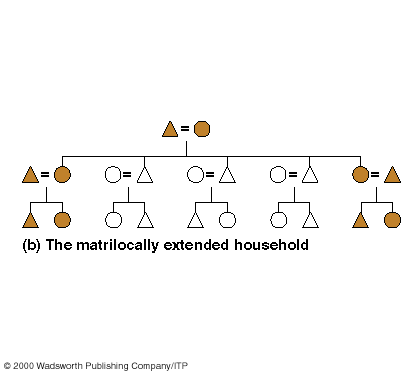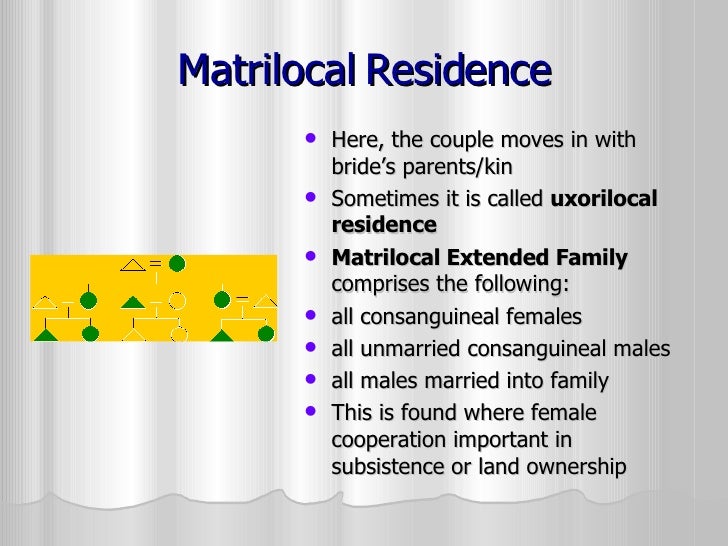Matrilocal residence
Matrilocality (Latin mater 'mother', locus " place ": residence in the mother ) refers to ethnosociology a living order of succession ( residence rule), in which a couple after marriage its budget establishes the place of residence of the mother of one of the spouses, the other partner consults. The early social anthropology understood it living with the mother of the wife.
Uxorilokalität ( " the place where the wife " ) is more general terms and refers to the establishment of the marital residence with the wife, her mother, family or the place of their descent group ( lineage, clan), the husband may call in. Uxorilokal is currently the preferred meaning " with or near the wife's family ," the misleading matrilocal. The term uxori - locally is derived from the Latin uxor "wife" ( "woman": mulier ), while the male equivalent of viri - locally from vir " man " is derived ( "husband": maritus ), a reflection of female subordination in Roman marriage.
Woman -centered residence rules can be found worldwide at 32 percent of all matri - linear, ordered only after the mothers line indigenous peoples and ethnic groups that make up 13 percent of the turn acquired in 1300 ethnicities. In them, the close relationship between the wife, her sisters, her mother and her sisters remain ( aunts ) made while the family of the husband is not considered to be related. Usually form mothers, sisters and daughters of a core group. This centering on the mother is also called Matrifokalität (Focus: Standing at the center ), to refer to the woman as the central figure of the family, the household identity and continuity, the father is often absent or has very little meaning. The woman -centered core groups may be joined in extensive Matri lineages, within which all relationships adopt a common original ancestress only. All husbands remain her own family attributed this was matrilineal or patri - ordered linearly according to the fathers line. Worldwide there is only one ethnic group with patri - linear descent rule, but matri - local residence episode rule.
Avunkulokalität ( " the place where the mother's brother " ) refers to the taking up residence with his uncle of the husband: the brother of his mother. Also, this residence is usually found only in matrilineal societies; the mirrored case that a husband takes his wife to Mutterbuder, is practically non-existent. 38 percent of all matrilineal ethnic groups live avunku -local, this residence rule holds on the common ancestry interconnected together men and women scattered spatially associated matrilineal. Mother brothers and sister sons here form the core of the housing unit. Although the sister sons come in the house of the mother's brother of the husband of the sister of the world; However, as adolescents or adults, they leave this household and live henceforth at their own mother's brother ( uncle ). The avunkulokale rule is sometimes understood in the literature in terms of " the place where the mother's brother 's wife ", there change adult children also often because they do not understand themselves as part of her father's family, but follow their maternal line. Therefore Avunkulokalität regarded as women-centered living rule, for the residence of the brother of the mother of the husband derives from the maternal line. However Avunku -locality is not directly connected with the social paternity of Avunkulats, particularly at the local residential nato sequence ( separate residence " the birthplace " ) is practiced.
Residence patterns
The found in practice residence pattern of choice of residence may be different from the cultural norm of usual residence rule in a society. At present, the modern way of life of the nuclear family is in many ethnic groups with traditionally female -centered living -order rules preferred and founded a new residence ( Neolokalität ), especially in cities (see the matrilineal Minangkabau in Sumatra ), or wives bring to her husband's family ( Virilokalität ). Often this has economic reasons, such as the dependence of jobs.
Residence and descent
Analysis of the records of 1,200 ethnic groups of the Ethnographic Atlas showed the following distribution of values for the living -order rules (residence) in societies with matrilineal descent rule ( descent ):
00000037.8 percent live avunku - local to the mother's brother of the husband 00000032.3 percent live uxori / matri - local to the wife, her mother, family, descent group ( lineage ) or Clan 00000018.3 percent live viri / patri - local to the husband or his father 00000011.6 percent live mainly nato local ( disconnected " at the birthplace of " remaining), or neo- local ( Residence 'at the new location " )
While there are all different ways of residence choice in matrilineal peoples who depend on the fathers line organized peoples the marital home almost exclusively in men a.
The social anthropologist Gabriele Rasuly - Paleczek however, noted in 2011: " Today, this reference is made to the Deszendenzsysteme usually rejected and therefore advocated patri - or matri -local not to use the terms. [ ... ] There are a total of ethnosociology despite extensive definition and Präsisierungsvorschläge still no uniform classification of different forms of residence "Unique is" Virilokalität: relatives of the husband - Uxorilokalität. Relatives of the wife. "










